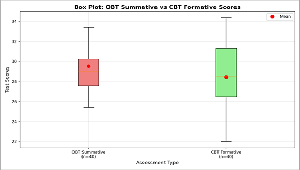Comparison of Open Book Test and Closed Book Test for Its Impact on Summative Assessment
Authors
##plugins.themes.bootstrap3.article.main##
Abstract
Objective: 1. To assess impact of open book and closed book assessment on summative assessment. 2.To know the perception of students on open book and closed book assessment. Design: Analytical observational study. Subjects/Patients: Students of MBBS Phase III, Part 1. Methods: The study is an analytical observational study conducted among MBBS Phase 3 Part 1 students of a Medical College. Total students enrolled in the study were 140. Enrolled students were divided into two groups (OBT & CBT). Comparison of score of summative assessment is compared with the method of assessment in formative. Results: The mean formative score for the OBT group was higher (31.15) compared to CBT (28.43). It shows OBT group achieved a higher mean score compared to the CBT group's. Significant association was found between test score and test group with t value of 2.2613. Conclusion: The findings suggests that OBT has better impact on summative assessment compared to CBT.
##plugins.themes.bootstrap3.article.details##
Copyright (c) 2025 Dr Shwetha Hariba, Dr Madhavi Gajula, Dr Sheethal M P

This work is licensed under a Creative Commons Attribution 4.0 International License.
Creative Commons License All articles published in Annals of Medicine and Medical Sciences are licensed under a Creative Commons Attribution 4.0 International License.
Dr Shwetha Hariba, Associate Professor, Department of Community Medicine, Shri Atal Bihari Vajpayee Medical College and RI, Bengaluru, Karnataka, India.
Associate Professor, Department of Community Medicine, Shri Atal Bihari Vajpayee Medical College and RI, Bengaluru, Karnataka, India.
Dr Madhavi Gajula, Assistant Professor, Department of Community Medicine, Shri Atal Bihari Vajpayee Medical College and RI, Bengaluru, Karnataka, India.
Assistant Professor, Department of Community Medicine, Shri Atal Bihari Vajpayee Medical College and RI, Bengaluru, Karnataka, India.
[1] Morris Feller Phoenix OPEN-BOOK TESTING AND EDUCATION FOR THE FUTURE. Studies in Educational Evaluation, Vol. 20, pp. 235-238, 1994)
[2] Entwistle NJ. Understanding Student Learning. London: Croom Helm, 1983.
[3] Ramsden P. Learning to Teach in Higher Education,2d ed. New York: RoutledgeFalmer, 2003.
[4] Wakeford R. Principles of assessment. In Fry H, Ketteridge S, Marshall S, eds. A Handbook for Teaching and Learning in Higher Education: Enhancing Academic Practice. London: Kogan Page, 1999:58–69.
[5] Vicki H.M. Dale n Barbara Wieland n Birgit Pirkelbauer n Amanda Nevel. Value and Benefits of Open-Book Examinations as Assessment for Deep Learning in a Post-graduate Animal Health Course. JVME 36(4) 6 2009 AAVM: 404-410
[6] Charline Cade, Jérémie Riou, Isabelle Richard, Catherine Passirani, Elisabeth Letertre, Anne-Victoire Fayolle. Comparison of open and closed book test for admission in medical school. MedEdPublish (2016). 2018 Jan 25;7:25.
[7] Noel Entwistle. Understanding Student Learning. British Journal of Educational Studies. jan 1983; 32(3)
[8] Tarrant, M., Dazeley, S., & Cottom, T. (2009). Social categorization and empathy for outgroup members. British Journal of Social Psychology, 48(3), 427–446.
[9] Heijne-Penninga, Marjolein; Kuks, Jan B. M.; Hofman, W. H. Adriaan; Cohen-Schotanus, Janke. Influences of deep learning, need for cognition and preparation time on open- and closed book test performance. Medical education.2010:884-89
[10] Green SG, Ferrante CJ, Heppard KA. Using Open-Book Exams to Enhance Student Learning, Performance, and Motivation. J Eff Teach. 2016;16(1):19-35.
[11] Sam AH, Reid MD, Amin A. Assessing open-book examination in medical education. Med Educ. 2020;54(12):1123-1124.
[12] Gharib A, Phillips W. Cheat Sheet or Open-Book? A Comparison of the Effects of Exam Types on Performance, Retention, and Anxiety. Psychology. 2012;2(8):469-478
[13] Dermo, J. (2009). Open-book, open-web online examinations: Student perceptions. Assessment & Evaluation in Higher Education, 34(5), 565–579
[14] Dale, V. H. M., Wieland, B., Pirkelbauer, B., & Nevel, A. (2009). Value and Benefits of Open-Book Examinations as Assessment for Deep Learning in a Postgraduate Animal Health Course. Journal of Veterinary Medical Education, 36(4), 403–410.
[15] Ali G Alghamdi. Assessing Medical Student Perceptions of Open-Book Exams for Self-Directed Learning. Cureu. 2024 Apr 28;16(4):e59218

